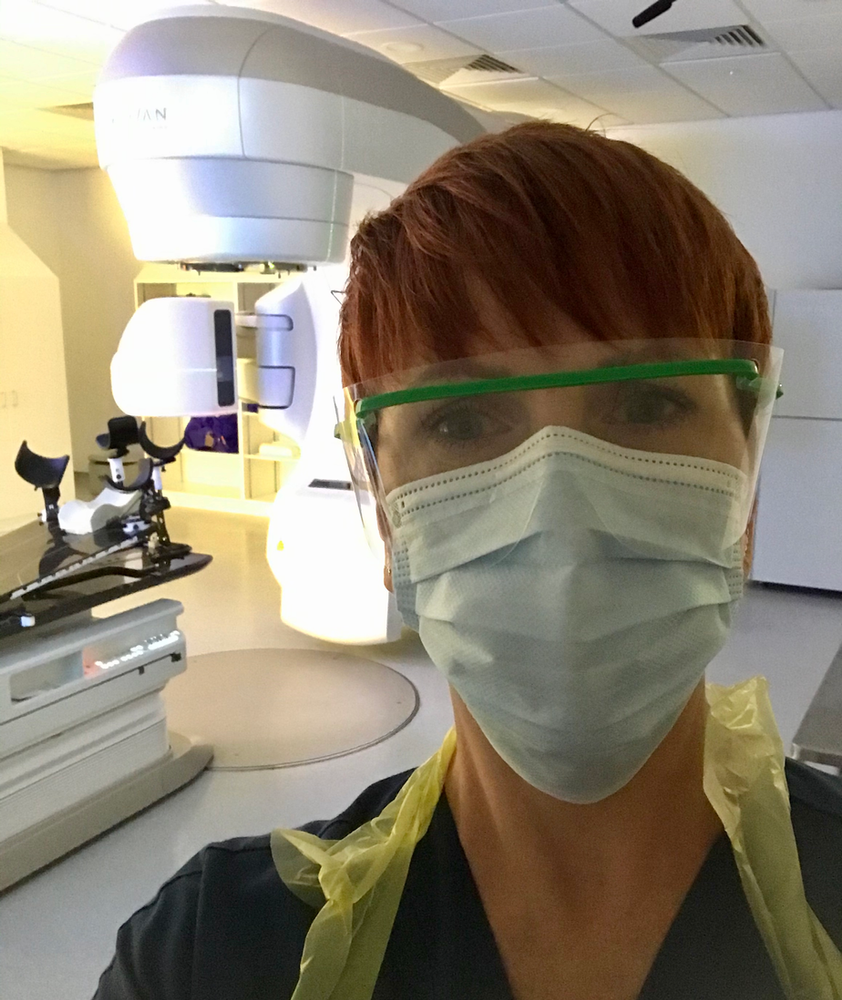
I am a therapeutic radiographer. Every day since the emergence of the COVID-19 virus and the subsequent lockdown that has brought the country to a grinding halt, I have made my essential journey to work and carried on pretty much as normal. For while the focus has been on my colleagues working tirelessly in ICU, respiratory care and other areas of the COVID-19 frontline, for much of the NHS it has remained ‘business as usual’. Other healthcare needs don’t vanish just because something new emerges to challenge our resources, and cancer hasn’t stopped in its tracks, so nor have I.
The normality of working in radiotherapy these last two months has been refreshing. The daily battles with bladders too small and rectums too big, bodies that won’t relax or stay where you place them, and machines that are temperamental at best and broken down at worst, have been no less frustrating. But when I have seen so many people not knowing if and when they will have a job to go back to, these frustrations have not been taken for granted.
While we radiographers and our colleagues have continued to work through the pandemic, this has not been without a great deal of change. It has become a much more impersonal world for starters, with conversations taking place behind a mask or over the phone. True face-to-face interactions are a distant memory. And we know the PPE is here to stay for a while, until COVID-19 is no longer a threat at least. To help ease the pressure on the NHS frontline, the government also insisted visits to hospitals must be minimised or avoided altogether meaning fractionations changed, patients’ treatments were delayed and alternative therapies offered. As a result, fewer people were coming through our doors and many of those who did come, stayed for less time than under ‘normal’ circumstances. The hectic world of radiotherapy got a little bit quieter.
Those of us working in radiotherapy know that the changes made were necessary. Cancer doesn’t give up easily and the nature of the disease and the treatments designed to kill it leave its sufferers more susceptible to other illnesses like COVID-19. Doctors had to make impossible choices. Did they offer people a treatment that could cure them of cancer or suggest they stay at home to reduce their risk of exposure to a virus that could inadvertently affect the efficacy of their treatment plan or, even worse, kill them? It was an unenviable task.
Statistics have also shown that cancer referrals have fallen to an alarmingly low level. Nobody believes this is because cancer took a break to let the COVID-19 virus have its moment in the spotlight. Cancer doesn’t just disappear so we can only assume that the lockdown message to stay inside hit home a little too well. Maybe that call to the GP to get symptoms checked out didn’t seem so essential in the COVID-19 climate.
The situation is beginning to change again though, and the COVID-19 focus is slowly shifting from the number of dead and the all-important R number, to the matter of easing lockdown and getting the country moving again, albeit at a necessary snail’s pace. In time, COVID-19 and all the stories that come with it will fall from the headlines and the clapping for keyworkers will stop; but radiotherapy has never stopped and will never stop. If anything, we’ll be working harder than ever. Those who have had treatment delayed, those who at last get their surgery and those who didn’t get around to getting their suspicious lump or worrying symptom investigated will all find themselves walking through our doors.
These people are already starting to trickle back onto our lists but we know there is a bigger influx of new patients coming. We will work tirelessly to get them through radiotherapy quickly and will treat each individual with the friendly care, dignity and respect that is the pride of our profession. And we will embrace the changes in practice and fractionations that will become the new norm as a result of a period that has forced radiotherapy departments across the world to find more efficient ways of working.
Most importantly we will keep everything crossed that when these new patients come, they do so with the prospect of cure, and that the delays caused by placing the focus of attention and resources onto COVID-19 and away from other areas of the NHS for so many weeks haven’t pushed them on to a palliative pathway. There has been too much death already. In reality, however, we know that the many weeks of lockdown and self-isolation to flatten the curve will have far reaching implications. And the figures we have heard being read out nightly at the government briefings are likely the mere tip of an iceberg of deaths caused by this pandemic. The fallout of the COVID-19 virus is now our challenge to take on. And we’re ready!
While you’re here… we need your help…Action Radiotherapy are supporting the drive to increase access to Stereotactic Ablative Radiotherapy (SABR) across the UK to help deal with the backlog of cancer cases due to COVID-19. If you are a radiotherapy professional, please join us and add your name to this open letter urging Matt Hancock to lift the restriction on SABR services. Sign the letter here: ,www.actionradiotherapy.org/letter

